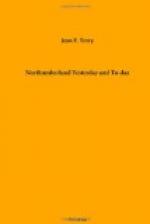“Yet I will stay at Otterbourne,
Where you shall welcome be;
And if ye come not at three dayis end,
A fause lord I’ll call thee”
Next day the Scots left Newcastle and marched northward. They took Sir Aymer de Athol’s castle of Ponte-land, and the good knight Sir Aymer himself, and went on their way, harrying and burning as they went. At Otterburn they halted, and rested all night, making huts for themselves of boughs and branches. The spot they had chosen was a strong one, on the site of a former British camp; and not only was it surrounded by trees, but was near marshy ground as well. Next day they attempted to take Otterburn tower, but without success.
Meanwhile word was brought to Hotspur that the Scots would spend the night at Otterburn; and he, without waiting for Walter de Skirlaw, Bishop of Durham, who was expected that evening with a strong force, at once set off with 600 spearmen, and a force on foot which is variously given as anything from 800 to 8,000. They covered the thirty-odd miles by the time evening fell: and as the Scots were at supper in their little huts, they were startled by a tumult amongst their grooms and camp-followers, and cries of “a Percy! a Percy!” and the Englishmen were among them. The Scottish leaders had placed their camp-followers and servants at the outermost; part of their encampment, facing the Newcastle road; and Hotspur’s force, ignorant of this, mistook it for the main camp. While they were thus engaged, the Scottish knights were enabled to make a detour around the scene of the first attack, and take the English in the rear. With loud shouts of “Douglas! Douglas!” they fell upon them, and a fierce hand-to-hand struggle began. The moon rose clear and bright, and the quiet evening air was filled with the din of battle, the ring of steel on steel, the crash of axe on armour, the groans of the wounded, and the battle-cries of the combatants on each side. Sir Ralph Percy, pressing too rashly forward, was captured by a newly-made Scottish knight, Sir John Maxwell. The battle was turning in favour of Hotspur, when Douglas sent his silken banner to the front and with renewed shouts of “Douglas!” the Scots pressed forward and overbore their foes. According to Froissart, there was not a man there, knight, squire, or groom, who played the coward. “This bataylle was one of the sorest and best foughten without cowards or faynte hearts; for there was neither knight nor I squire but that did his devoyre and foughte hande to hande.” Great deeds were done, and the fame of none amongst them is greater than that of the gallant Widdrington;
“For Witherington my heart is woe,
That ever he slaine sholde be!
For when his legs were hewn in two
He knelt and fought on his knee”




